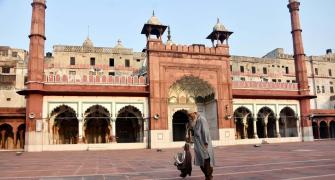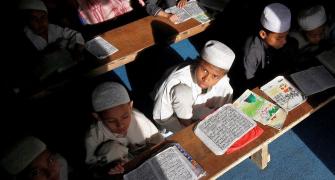A meeting of the joint committee of Parliament on the Waqf (Amendment) Bill on Friday witnessed fireworks with members vociferously opposing certain provisions of the draft legislation, leading to a brief walkout by opposition members.

The panel, chaired by Bharatiya Janata Party member Jagadambika Pal, heard the views of All India Sunni Jamiyatul Ulama of Mumbai, Delhi-based Indian Muslims for Civil Rights (IMCR), Uttar Pradesh Sunni Waqf Board and Rajasthan Board of Muslim Waqf during the day-long sitting lasting nearly eight hours.
The main bone of contention were the provisions of 'declaration of Waqf by user', designation of district collector as the primary authority in determining the classification of property as Waqf and inclusion of non-Muslims in the Central Waqf Council and state boards.
Certain remarks made by BJP member Dilip Saikia against Aam Aadmi Party member Sanjay Singh led to a heated exchange between the opposition and BJP members.
There was uproar during the proceedings as objections were raised over the presence of a lawyer as a representative of both Indian Muslims for Civil Rights and the Rajasthan Board of Muslim Waqf.
The issue of the presence of the lawyer during two separate depositions led to a brief walkout by opposition members including Mohammad Jawed and Imran Masood (both Congress), Arvind Sawant (Shiv Sena-Uddhav Balasaheb Thackeray), Sanjay Singh (AAP), Asaduddin Owaisi (All India Majlis-e-Ittehadul Muslimeen), A Raja and M Mohamed Abdulla (Dravida Munnetra Kazhagam) and Mohibbullah (Samajwadi Party).
Opposition members also flagged concerns over deletion of Waqf by user provision in the Waqf Act. In Uttar Pradesh, the title of over one lakh properties, notified under Waqf by user provision, will be destabilised and made vulnerable to encroachment due to deletion of the said provision, opposition members argued.
They also argued that by legally recognising the evidentiary rule of 'Waqf by user', historic sites that have been used continuously as Waqf would be protected.
In the absence of such protection, such religious places would be susceptible to mala fide litigation.
The meeting also saw a heated exchange between BJP member Medha Kulkarni and Owaisi.
The next meetings of the committee are scheduled on September 5-6 and the chairman is learnt to be keen to increase the frequency of sittings further to enable speedier consultations among various stakeholders.
The Waqf (Amendment) Bill was introduced in Lok Sabha on August 8 and referred to the joint committee of Parliament after a heated debate with the government asserting the proposed law did not intend to interfere with the functioning of mosques and the opposition calling it a targeting of Muslims and an attack on the Constitution.
In its marathon first meeting earlier this month, opposition MPs flagged objections over a host of provisions as the Union minority affairs ministry made a presentation in the proposed law.
According to a statement issued by the Lok Sabha Secretariat, the committee has asked for 'views/suggestions from the public in general and NGOs, experts, stakeholders and institutions in particular' considering the 'wider implications' of the bill.
People have been asked to share their suggestions in writing in the next 15 days.









